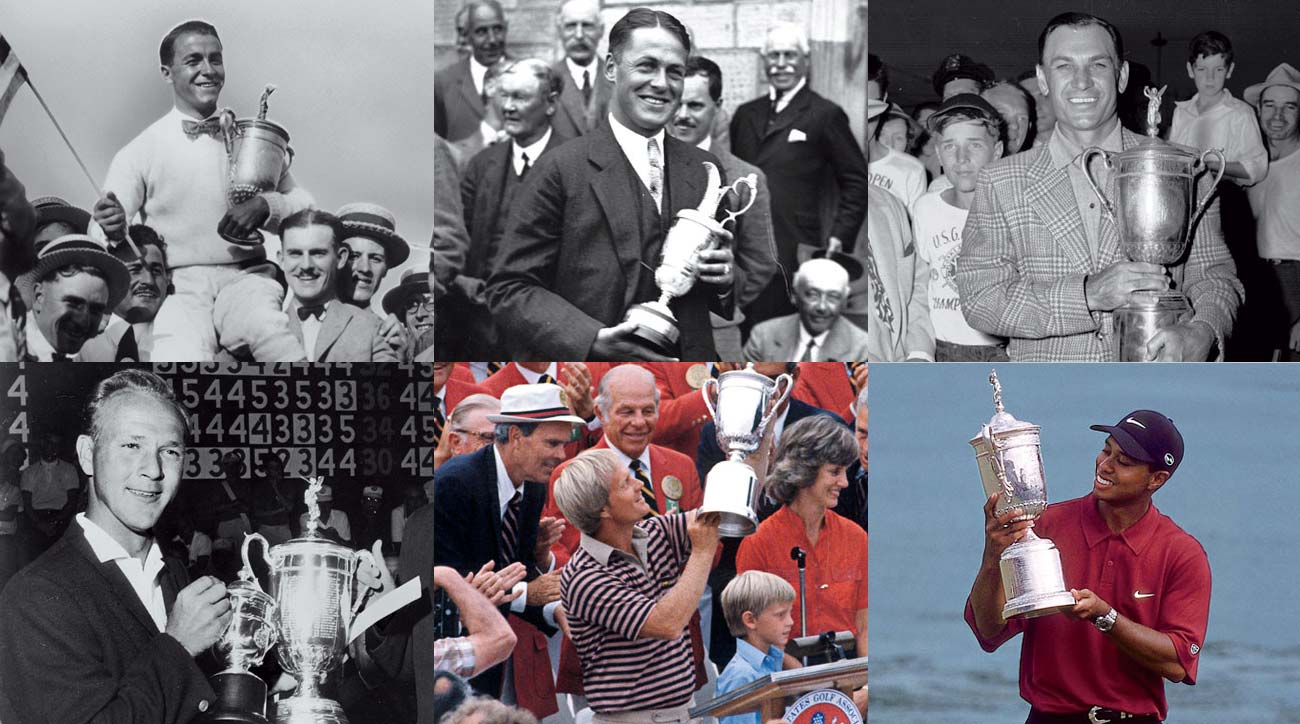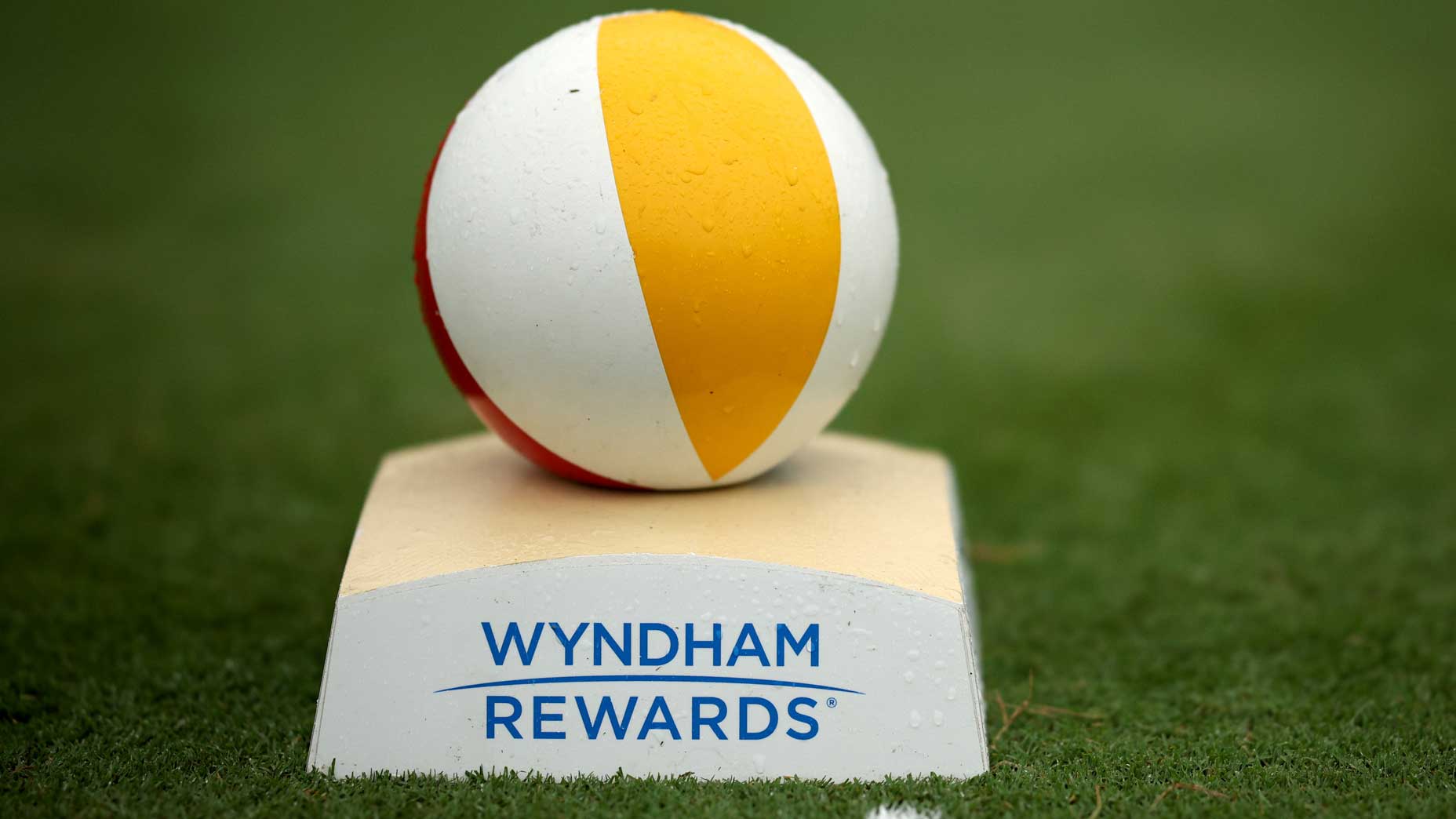It wasn’t the Grand Slam. Or even the Tiger Slam. But it was a sparkling feat by any measure. With his wins this year at the U.S. Open and the PGA Championship, Brooks Koepka joined a rarefied list of golfers who have captured two majors in a single season.
The first was Gene Sarazen in 1922. The most recent before Koepka was Jordan Spieth, in 2015. In the intervening decades, 18 other players have pulled off twin killings. Some have done so more than once.
For those of you keeping score at home, here is a ledger of every double-major season in the history of the game, with a spotlight on six feats that stand out.
Gene Sarazen, 1922
He wasn’t yet The Squire. Just an unsung Pennsylvania club pro. That changed at the ’22 U.S. Open, where Sarazen mounted a final-round charge to overtake a 20-year-old amateur named Bobby Jones. Later that same season, on familiar turf, Sarazen backed up his big win with another: the PGA Championship at Oakmont. At a victory party at a Pittsburgh hotel, Sarazen burst out of a large, papier-mâché golf ball, a grand entrance for a man who’d already seized an even larger stage.

Bobby Jones, 1930
Four years later, in 1934, Jones would host the first annual invitational at a little club he co-founded in Augusta, Ga. But in 1930, he was busy making history of a different kind. It started when he captured the British Amateur, which he followed with a W at the British Open. Two up, two down, but Jones wasn’t done. Next came the U.S. Open, and then the U.S. Amateur. Jones won both, completing what the New York Sun described as the “impregnable quadrilateral.” Today we think of it
as the pre-Masters Grand Slam.

Arnold Palmer, 1960
In the years since Bobby Jones’s run of dominance, the term “Grand Slam” had been all but dead and buried. Palmer gave the golf world reason to dust it off. First, he won the Masters, with a birdie on 18 to best Ken Venturi, and then the U.S. Open, at Cherry Hills, coming back from seven down with a vintage Arnie charge. By the time the King teed off at the British Open, talk of the Grand Slam was back in circulation. Palmer gave it a good go but fell just shy at the Old Course, losing to Kel Nagle by a single shot.

Ben Hogan, 1951
The year that gets most mention is 1950, when Hogan returned from the wreckage of a car crash to claim the U.S. Open. But his showing in ’51 wasn’t shabby either. Entering the Masters with a history of close calls, the Ice Mon sealed the deal by chasing down Skee Riegel and Sam Snead. For good measure, he also nabbed the ’51 U.S. Open, becoming the first player since Ralph Guldahl to go back-to-back in the event. In the post-Hogan era, only Curtis Strange and Koepka have done the same.

Jack Nicklaus, 1980
To amass 18 career majors, it helps to capture them in bunches. Nicklaus did just that, notching two per season in ’63, ’66, ’72 and ’75. By 1979, though, it seemed the Golden Bear had slipped into hibernation; for the first time in his professional career, he slumbered through a year without a victory. Which made 1980 all the more inspiring. After a middling finish at the Masters, Nicklaus won the U.S. Open, then the PGA Championship. The latter was his 17th major, and the last before his folkloric Masters win in 1986.

Tiger Woods, 2000
At the peak of Tiger’s powers, the question wasn’t so much whether he would win—it was how large the margin of victory would be. At the U.S. Open, it was 15 shots; at the British Open, it was eight. An out-of-body Sunday from Bob May kept the PGA Championship from being a laugher, but Tiger still emerged with a win. The following spring, with his triumph at the Masters, a new term was minted. Woods would go on to win multiple majors in ’02, ’05 and ’06, but not even he could match his Tiger Slam.

Strength In Numbers: The Multiple-Major Seasons
1922: Gene Sarazen (U.S. Open, PGA Championship)
1924: Walter Hagen (U.S. Open, PGA Championship)
1926: Bobby Jones (U.S. Open, PGA Championship)
1930: Bobby Jones (British Amateur, British Open, U.S. Open, U.S. Amateur)
1932: Gene Sarazen (U.S. Open, British Open)
1941: Craig Wood (Masters, U.S. Open)
1948: Ben Hogan (U.S. Open, PGA Championship)
1949: Sam Snead (Masters, PGA Championship)
1951: Ben Hogan (Masters, U.S. Open)
1953: Ben Hogan (Masters, U.S. Open, British Open)
1956: Jack Burke Jr. (Masters, PGA Championship)
1960: Arnold Palmer (Masters, U.S. Open)
1962: Arnold Palmer (Masters, British Open)
1963: Jack Nicklaus (Masters, PGA Championship)
1966: Jack Nicklaus (Masters, British Open)
1971: Lee Trevino (U.S. Open, British Open)
1974: Gary Player (Masters, British Open)
1975: Jack Nicklaus (Masters, PGA Championship)
1977: Tom Watson (Masters, British Open)
1980: Jack Nicklaus (U.S. Open, PGA Championship)
1982: Tom Watson (U.S. Open, British Open)
1990: Nick Faldo (Masters, British Open)
1994: Nick Price (British Open, PGA Championship)
1998: Mark O’Meara (Masters, British Open)
2000: Tiger Woods (U.S. Open, British Open, PGA Championship)
2002: Tiger Woods (Masters, U.S. Open)
2005: Tiger Woods (Masters, British Open)
2006: Tiger Woods (British Open, PGA Championship)
2008: Padraig Harrington (British Open, PGA Championship)
2014: Rory McIlroy (British Open, PGA Championship)
2015: Jordan Spieth (Masters, U.S. Open)
2018: Brooks Koepka (U.S. Open, PGA Championship)








